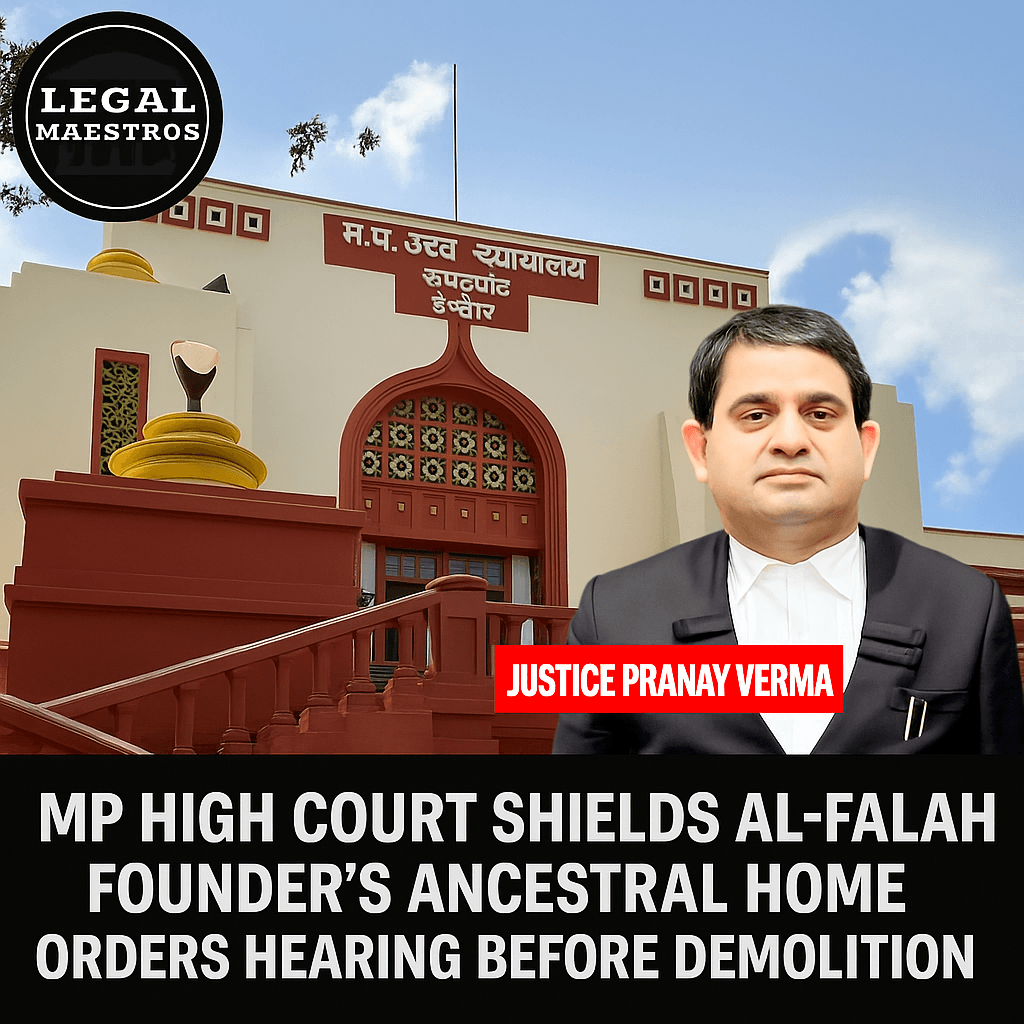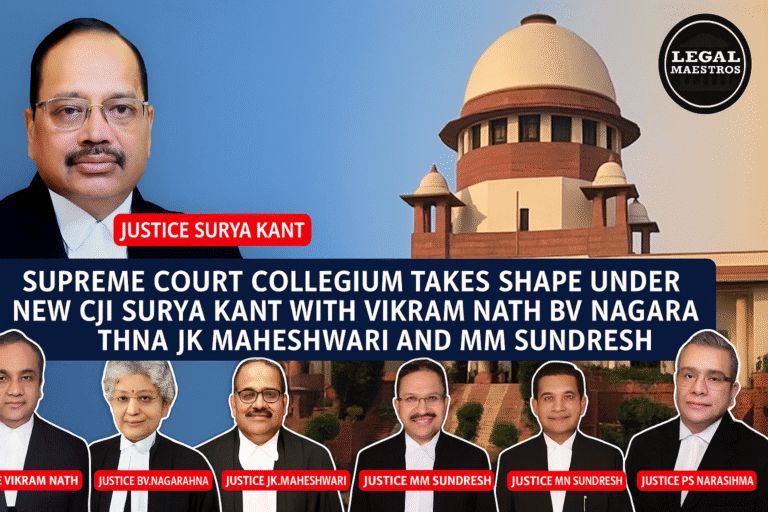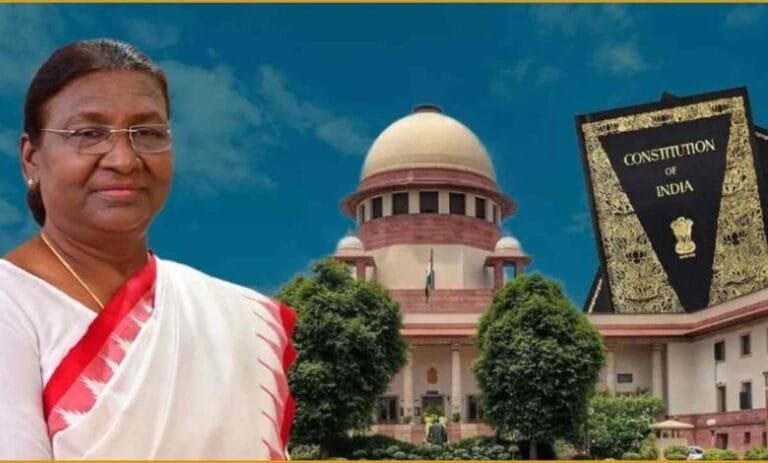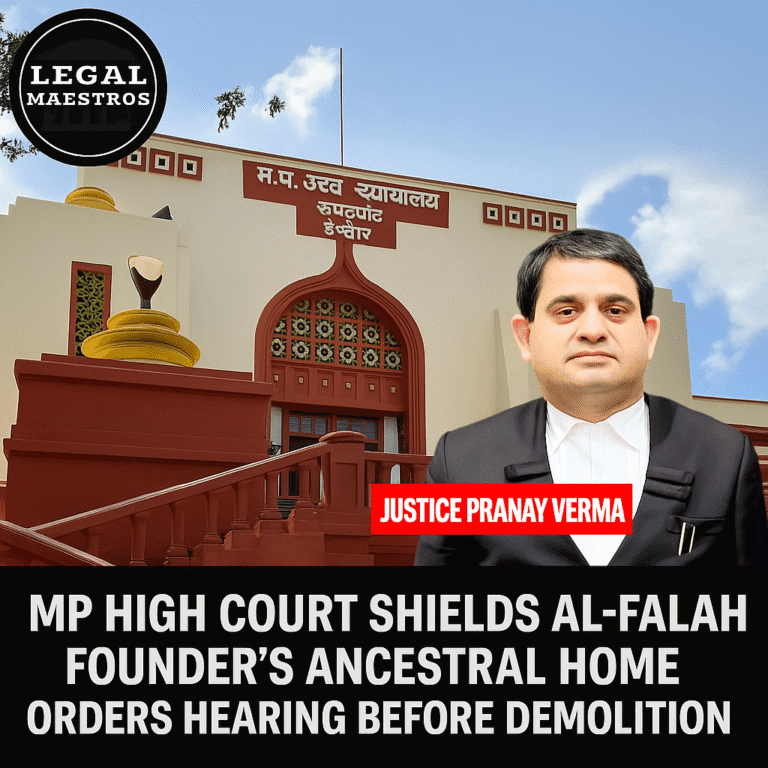
MP High Court Shields Al-Falah Founder’s Ancestral Home Orders Hearing Before Demolition
The High Court Intervention
It is the ancestral house of Jawad Ahmed Siddiqui who is the founder of Al-Falah University. The local government, in this case, the Mhow Cantonment Board, had given a notice to demolish the building. They asserted that construction of sections of the house was done against the law and without authorization. This move has been however temporarily halted by the High Court to bring about fairness.
The court ruling gives an immediate respite to the inhabitants of the house. A resident Abdul Majid had also made an appeal against the demolition order. According to him, he was not even granted an opportunity to present his side of the case by the authorities. The court also concurred that it was not just to hasten into demolition without a due hearing. The judge granted the stay of fifteen days, until no bulldozers were allowed to touch the property.
This court ruling emphasizes the need to observe due process of the law. The court observed that the police were using outdated notices to justify what they were doing. The High Court has helped strengthen the rights of property owners to be heard by preventing the demolition. At this juncture, the authorities are required to hear the defense of the petitioner after which they can make a final decision. This makes the process transparent and juridically good.
For any queries or to publish an article or post or advertisement on our platform, do call at +91 6377460764 or email us at contact@legalmaestros.com.
The case has attracted a lot of attention because the original owner of the building is of great profile. Jawad Siddiqui and his institutions are now under the investigation of different investigation organizations. The demolition notice has been issued when the family was already being highly pressurized by legal implications. The intervention of the High Court is like a balance to the administrative power whereby unrelated issues to the law should not be taken to cause procedural short cuts in the property situations.
A Question of Natural Justice.
The principle of natural justice was the key driving factor in the ruling of the High Court. The judge noted that there was a huge time differences in the actions of the Cantonment Board. The initial notices on illegal construction related to illegal building had been issued by the board in 1996 and 1997. There was no such intervention during nearly thirty years, and the house was standing. The court saw it not possible to go about those decades-old notices at this moment.
The judge commented that the authorities should have acted many years ago in case they wished to revive a thirty-year-old dormant case without a fresh hearing, which goes against the principle of fairness. According to the court, the petitioner should have a new chance to prove his case. The silence on the part of the authorities over a long period of time gave the impression that the issue was either resolved or thrown away.
This is what is known as the doctrine of legitimate expectation by legal experts. When a governmental institution remains silent during decades, the citizens presume that their property is secure. Razing that silence with an impromptu demolition order is regarded to be arbitrary. The High Court made the Cantonment Board adhere to the due process of law. This is by issuance of a new show-cause notice and giving an opportunity to the owner to respond.
The order of the court described a definite plan of the order of next actions. The petitioner Abdul Majid is allowed a period of fifteen days to respond with a detailed reply. He has to provide all the pertinent documents to demonstrate that the construction was legal. Once he has made his response, the Cantonment Board must provide him with a personal hearing. It is not until this has been done that they can reach a final reasoned order.
The structure is the one that is popularly known as Maulana Building locally. It is a historical place in Kayastha Mhow neighborhood. It was initially owned by a reputable cleric known as Hammad Ahmed Siddiqui, who was the father of the Al-Falah founder. It is a four-story building with a basement which the authorities allege goes against the local building regulations.
The matter of the house ownership has turned into a complicated legal problem. Its founder Hammad Ahmed Siddiqui died some years ago. His son, Jawad Siddiqui transferred the property to Abdul Majid. This was transferred by a “Hiba,” or an oral gift act is valid within the Islamic law. Abdul Majed alleges to be the actual owner and lawful resident of the house.
These changes might not be captured in the records of the Cantonment Board however. According to the authorities, the building is still entitled to the name of the dead father. Their argument is that the ownership had never been revised in their records, so the whole structure is technically illegal. This inconsistency in the records and the actual occupant makes the case more complicated.
The petitioner said that the demolition notice was imprecise and ambiguous. He said that the notice was not clear on what aspects of the house were illegal. He was in no position to conclude right or wrong action without knowing the exact part that was not authorized. This ambiguity is yet another factor that the high court felt they needed to have a stay. Any legal notice must entail a clear identification of the alleged violation.
Time and the Wider Enquiry.
The demolition notice is also subject to numerous eyebrows due to its timing. This was released only days following the arrest of Jawad Siddiqui by the Enforcement Directorate. The Al-Falah University is now under investigation by the central agencies on grounds of financial strangeness. Money laundering and frauds in terms of high amounts of money are also accused.
Moreover the university has been sucked into a far graver investigation. There are also reports indicating that the agencies are investigating alleged connections between some university personnel and a recent explosion in the Red Fort area in Delhi. This angle of terror link has put the institution in the national limelight. The demolition notice seemed to most people to be a coordinated attack by several state officials.
The attorney of the petitioner had given a clue that these external forces must have contributed to the abrupt action. Although the demolition case is technically concerning building codes, it cannot be completely disregarded in the context. The government appears to be investigating all the property that is connected with Siddiqui family. This puts in place an environment where administrative measures may be taken to be punitive and not regulatory.





